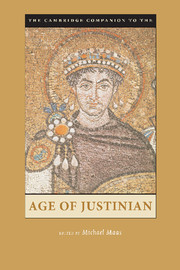Book contents
- Frontmatter
- Part 1 Structures and Ideologies of Empire
- Part 2 Religion and Philosophy
- 9 The Legacy of Chalcedon
- 10 Society and Community in the Christian East
- 11 Emperors and Popes in the Sixth Century
- 12 Christian Piety and Practice in the Sixth Century
- 13 Philosophy in the Age of Justinian
- Part 3 Literature and the Arts
- Part 4 Peoples and Communities
- Bibliography
- Index
- Plate Section 1
- Plate Section 2
10 - Society and Community in the Christian East
from Part 2 - Religion and Philosophy
Published online by Cambridge University Press: 28 May 2006
- Frontmatter
- Part 1 Structures and Ideologies of Empire
- Part 2 Religion and Philosophy
- 9 The Legacy of Chalcedon
- 10 Society and Community in the Christian East
- 11 Emperors and Popes in the Sixth Century
- 12 Christian Piety and Practice in the Sixth Century
- 13 Philosophy in the Age of Justinian
- Part 3 Literature and the Arts
- Part 4 Peoples and Communities
- Bibliography
- Index
- Plate Section 1
- Plate Section 2
Summary
In the course of the sixth century the Christian world became irremediably divided over a dogmatic issue. The point of contention was whether one should speak of two natures in Jesus Christ, as it had been decided by the Council of Chalcedon (451), or of only one new nature, in which divinity and humanity were joined together. This theological discussion strongly resonated in what we now call the Christian East - the eastern provinces of the Roman Empire and neighboring areas outside the empire, with their distinct linguistic and cultural characteristics.
Throughout his long reign, Justinian attempted to bridge the rift by winning the anti-Chalcedonians over to some sort of acceptance of the council, which since 518 had become the cornerstone of imperial religious policy. He failed, however, to achieve this goal. The opposition between the imperial church and the anti-Chalcedonians that existed at the beginning of Justinian’s – indeed, from the beginning of Justin’s – reign,was still there at his death. By that later date (565), not only had the opposition become much more articulate, the anti-Chalcedonians also had started building up their own ecclesiastical structure and had laid the foundations for the material and spiritual survival of their communities, which still exist today.
In fact, it is in Justinian’s failed religious policy that we find the roots of a self-confident, powerful movement that was able to assert itself in spite of hardship and oppression. Although Justinian oppressed the anti-Chalcedonians and occasionally persecuted them, he also created the conditions that allowed them to exist, to shape their identity, and to negotiate their own domains of influence and power.
- Type
- Chapter
- Information
- The Cambridge Companion to the Age of Justinian , pp. 239 - 266Publisher: Cambridge University PressPrint publication year: 2005
- 8
- Cited by



